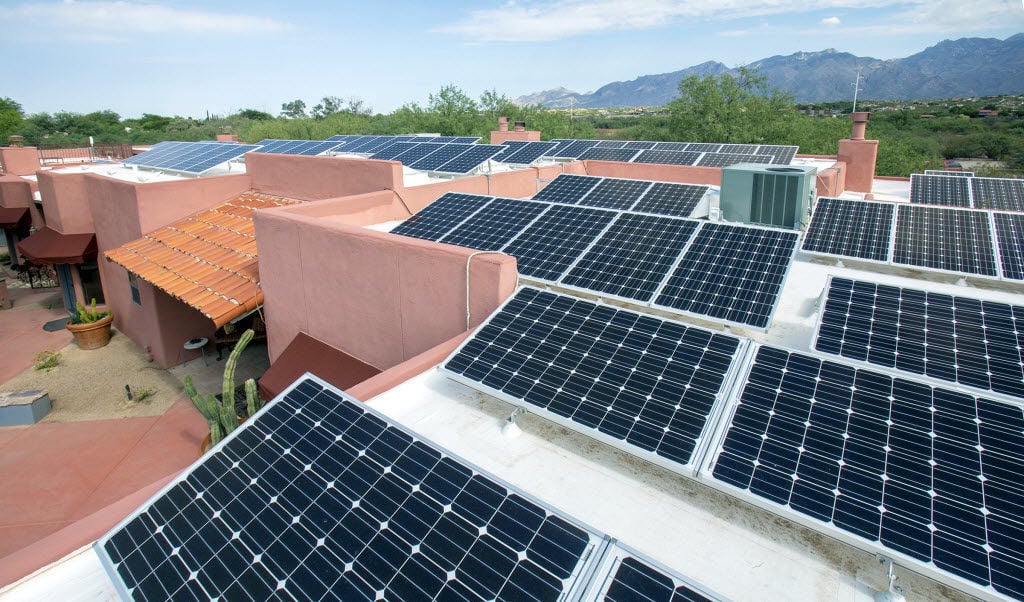A state administrative law judge says plans by Tucson Electric Power Co. to expand company-owned solar energy programs should be put on hold while regulators study the value of rooftop solar.
TEP has proposed expanding a pilot program in which TEP installs solar panels on the roofs of customers who pay a flat monthly fee for power, as part of a 2016 renewable energy plan filed last year.
The utility also has asked the Arizona Corporation Commission for permission to launch a new residential solar program, in which TEP would build neighborhood-scale solar farms and offer nearby customers the power at a flat rate.
But in a recommendation to the Corporation Commission filed Friday, Administrative Law Judge Jane Rodda said regulators should defer approval of the programs pending the findings of separate proceedings on the value of customer-owned rooftop solar.
TEP’s rooftop solar program, called the TEP-Owned Rooftop Solar program, or TORS, was approved as a pilot by the Corporation Commission in December 2014. The program has a $10 million budget to install an estimated 600 rooftop systems, each with an average capacity of about 6 kilowatts.
Based on the popularity of the program, which TEP expects will be fully subscribed this fall, the utility wants to extend the program to an additional 1,000 customers at a cost of $15 million. Customers would pay $250 to sign up and agree to a flat charge of $16.50 per kilowatt, fixed for 25 years.
Because of TEP proposals to boost costs to customers who own their own rooftop solar systems, the utility’s 2016 renewable-energy plan was consolidated with TEP’s pending rate case.
But the issues of the expanded TORS pilot and the proposed new Residential Community Solar Program were split off for separate consideration, and hearings on those proposals were held before Rodda in April.
Private solar-energy developers represented by the Energy Freedom Coalition of America vehemently oppose TEP’s proposals, contending they are anti-competitive and unfair and would harm third-party solar-system providers.
The commission’s own utility staff said it opposes expanding the TEP-owned rooftop solar program for now, because TEP has not filed a full analysis of the pilot program, and it backs the larger-scale community solar program as a more cost-effective option.
The Residential Utility Consumers Office, a state watchdog agency, supports expanding TEP’s company-owned rooftop solar program but opposes the Residential Community Solar Program because it does not allow renters to participate.
On Friday, Rodda issued her recommended opinion and order, finding that it is “premature” to approve expansion of the TORS until the results of technical studies and potential modifications to so-called net metering tariffs are known.
Rodda found the concept of the Residential Community Solar Program in the public interest, but recommended the Corporation Commission defer action to a “Phase 2” proceeding based on findings of a separate proceeding on the value of rooftop solar.
TEP and other utilities have moved to impose new charges on rooftop solar customers and to cut the rate at which they are credited for excess power production under net metering, arguing that rooftop solar customers aren’t paying their fair share of the utility’s fixed costs.
The Corporation Commission is evaluating the value and cost of so-called “distributed generation” — rooftop solar — in a separate, generic proceeding that is expected to yield guidance in TEP’s pending rate case, as well as others.
In August, the Corporation Commission approved higher rates for TEP’s sister rural utility, UNS Electric, but it held off deciding on changes in treatment of rooftop solar customers pending the findings of the generic case on the value of solar.
The generic value-of-solar proceeding also will likely bear heavily on a rate case filed in June by Arizona Public Service Co., the largest state-regulated utility.
TEP’s rate case is expected to be considered by the full Corporation Commission at an open meeting starting Oct. 27.
The utility has reached a proposed settlement on its revenue requirement with the commission staff, RUCO and other parties to the case, but the pact sidesteps other rate issues including the treatment of rooftop solar customers.





